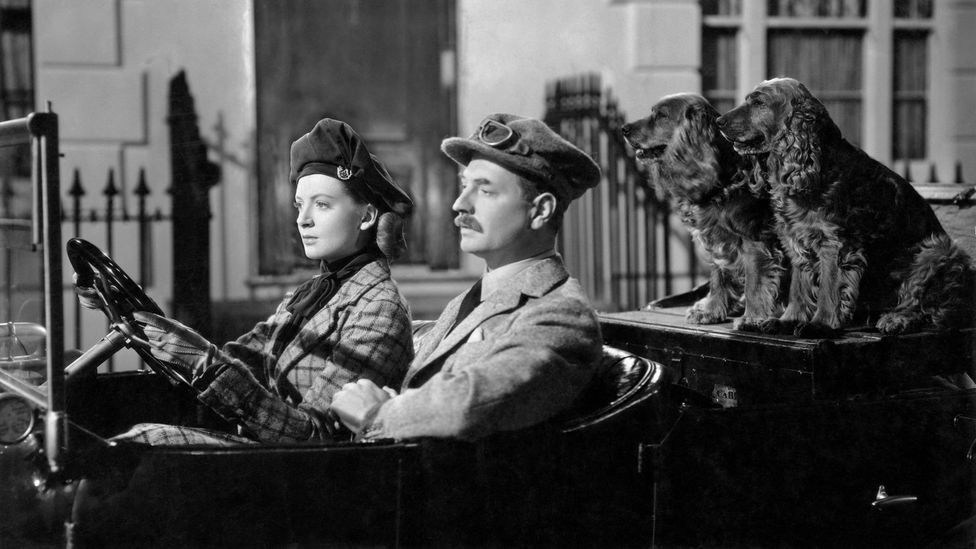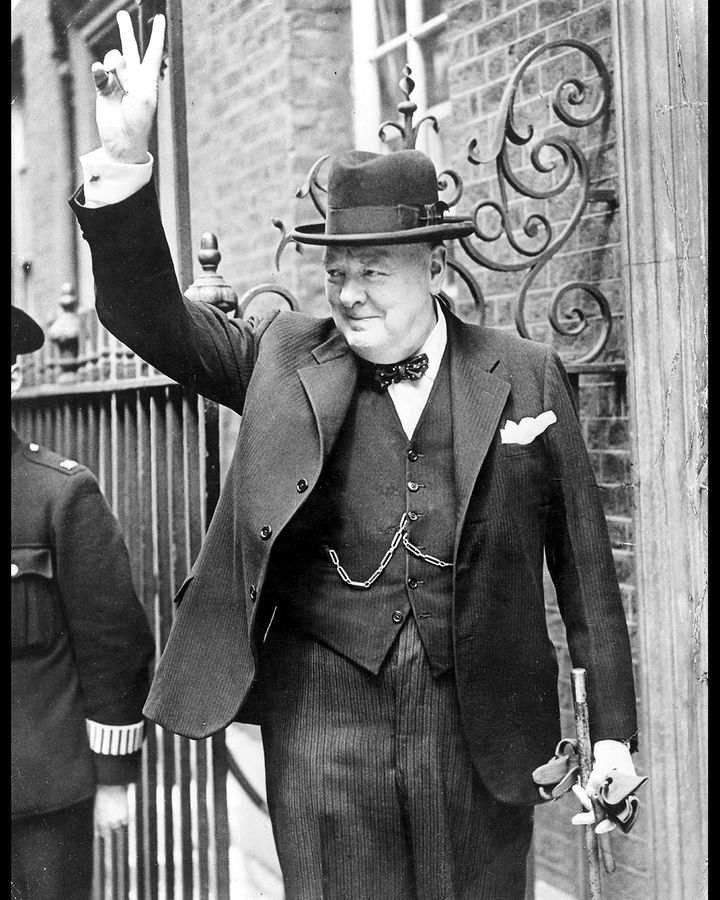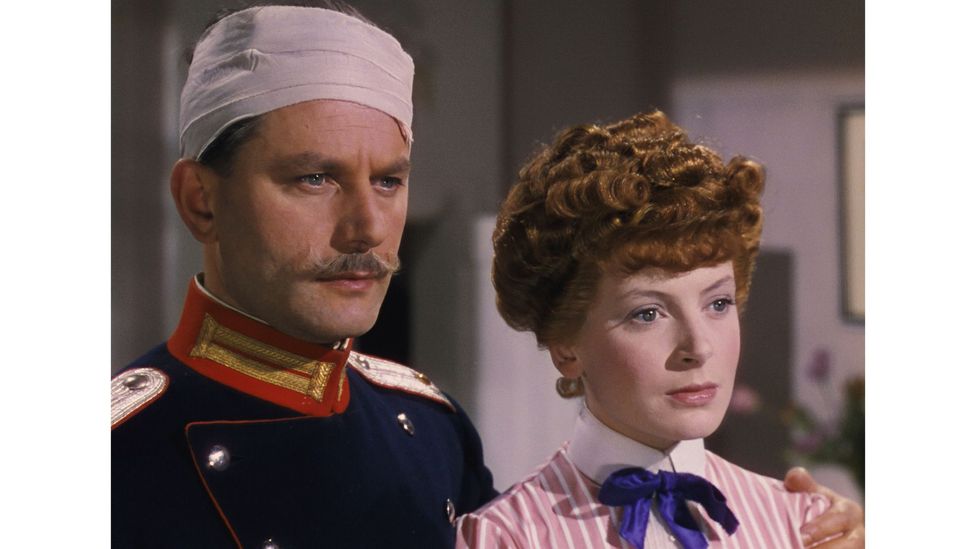Powell and Pressburger's classic satire about the British military turns 80 this month. Mark Allison reflects on the controversy around its production, which even incited the prime minister.
By early 1942, World War Two was in its third year and things still seemed to be going badly for the UK. In North Africa, British troops were on the retreat from the German Afrika Korps, while in Southeast Asia the vital colonies of Hong Kong, Malaya and Singapore had fallen to the Japanese with humiliating speed. Not since the French capitulation in mid-1940 had things seemed so dark.
More like this:
– From propaganda film to life-affirming classic
– The ultimate anti-war films
– The enduring allure of Black Narcissus
At a crucial House of Commons debate on the "War Situation" in February 1942, Labour MP FW Pethick-Lawrence made a speech railing against what he called "Blimpery" in the British war effort. He was referring to Colonel Blimp, a creation of cartoonist David Low published in the Evening Standard throughout the 1930s and 40s. Blimp was a pompous, upper-class army officer with portly features and a walrus moustache, intended as a satire of the UK's aristocratic military-imperial establishment. Low's cartoons captured the public mood following the series of British military disasters which opened WW2, and Blimp became a shorthand for all that was wrong with the British Empire's incompetent and out-of-touch elite.

The film traces the life of Roger Livesey's soldier Clive Wynne-Candy over four decades – with Deborah Kerr playing three different women in his life (Credit: Alamy)
It was in this context that British-Hungarian film-making duo Michael Powell and Emeric Pressburger – known jointly by the name of their production company, "the Archers" – conspired to make a Technicolor epic based on the character. Their two previous pictures, 49th Parallel (1941) and One of Our Aircraft is Missing (1942), had been explicitly pro-British propaganda efforts, but The Life and Death of Colonel Blimp would take a more critical stance. In an interview for the 1971 booklet Michael Powell in collaboration with Emeric Pressburger, Powell told K Gough Yates that he wanted to expose Blimp as "a symbol of British procrastination and British regard for tradition and all the things which we know are losing the war".
Churchill sometimes got a bee in his bonnet about things he didn't fully understand – Richard Toye
The Archers' script recasts Colonel Blimp as Major-General Clive Wynne-Candy, introducing him in then-present-day 1943 as the familiarly rotund and moustachioed caricature from Low's drawings. An extended flashback then moves 40 years into the past, finding Candy as a youthful subaltern on leave from the Boer War, Victoria Cross gleaming on his chest. Tracing this soldier's life over the subsequent four decades, three wars, and two doomed romances, Powell and Pressburger explore how Candy's reactionary worldview is shaped and calcified by his experiences as an unquestioning servant of the British military. As Powell wrote in a letter to the actor Wendy Hiller, reproduced in Ian Christie's edited edition of the film's screenplay, "Blimps are made, not born. Let us show that their aversion to any form of change springs from the very qualities that made them invaluable in action; that their lives, so full of activity, are equally full of frustration…"
The establishment upset
Authorities at the Ministry of Information and the War Office were dismayed by the project and refused any official support. According to SP Mackenzie's book British War Films 1939-45, Secretary of State for War PJ Grigg wrote to Powell in June 1934, "I am getting rather tired of the theory that we can best enhance our reputation in the eyes of our own people or the rest of the world by drawing attention to the faults which the critics attribute to us, especially when, as in the present case, the criticism no longer has any substance." A summary of the script found its way to Prime Minister Winston Churchill, who wrote to Minister of Information Brenden Bracken, "Pray propose to me the measures necessary to stop this foolish production before it gets any further."
"Churchill sometimes got a bee in his bonnet about things he didn't fully understand," Richard Toye, Professor of History at the University of Exeter and author of Winston Churchill: A Life in the News, tells BBC Culture. "He quite often had harsh, repressive instincts when it came to the media, but he didn't always follow them through, and other people stood in his way to try to make him see sense."
Indeed, Bracken was uncomfortable with Churchill's request, and responded that he had "no power to supress the film", warning that "in order to stop it the government would need to assume powers of a very far-reaching kind".
"Bracken's line was that British propaganda was geared towards the differences between democracy and dictatorship, and that to suppress the film would have been the sort of thing the Nazis did," James Chapman, Professor of Film Studies at the University of Leicester and author of The British at War: Cinema, State and Propaganda, tells BBC Culture. "A democracy, even in wartime, has to be strong enough to allow the expression of dissenting voices."

Winston Churchill in 1943, the year of the film's release – by which point the war had turned back in the UK's favour (Credit: Alamy)
Despite Churchill's fears, Powell and Pressburger's film paints the blimpish Candy as a broadly sympathetic figure. Played with charm and charisma by Roger Livesey, Candy is an essentially good-natured man who endures a life of heartbreak, loss, and conflict. His naïve values of "clean fighting, honest soldiering", on which all men of his class and generation were cultivated, and his desire to always see the best in people (even his enemies), are presented as admirable but ultimately hubristic qualities.
It's a beautiful portrait of the UK at a time when it was deciding how to resist total war without becoming monstrous itself – AL Kennedy
Candy's jingoism blinds him to the violence and hypocrisy inherent in the empire to which he has pledged himself, while his optimistic outlook cannot comprehend the enormity of the emerging Nazi evil he must face. He disbelieves reports of British atrocities in South Africa, and maintains his conviction that "right is might" even amid the senseless slaughter of World War One. When faced with the Third Reich's brutally effective blitzkrieg, he protests that he'd rather lose the war than resort to such "foul fighting".
Following the military catastrophes of 1940, Candy is forcibly retired into the Home Guard and superseded by a generation of energetic young officers from more humble origins. The brutal necessities of a war against fascism have consigned Blimpery to the past, and a newly meritocratic order is emerging in its place. The film appears to welcome this democratising social revolution, but not without a degree of melancholy towards the passing of the idealised old order – "he's such a dear old man," protests Candy's driver. It's a moving conclusion which leaves an ambivalent impression of Britain in the early 20th Century; at once nostalgic for a more chivalrous past, while clear-eyed about its fundamental corruption.
The vision of outsiders
"I think Colonel Blimp benefits from the vision of two different kinds of 'outsiders', with a distance that gave them a clear view of Britain and what it was," writer and performer AL Kennedy tells BBC Culture. "The portrait of America found in classic Hollywood was really an immigrant creation, but that kind of insight was arguably a little less common in the UK. Powell had an English public-school education, but his macabre artistic tendencies and anti-establishment views placed him outside the mores of his class, time and country.
"Pressburger had fled from the Nazis across Europe, learning languages and working on films as he went. Powell's darkness and Pressburger's European perspective, the realism and humour of both, combine perfectly. It's a beautiful portrait of the UK at a time when it was deciding how to resist total war without becoming monstrous itself."
If defeating the Nazis required the building of a more equitable UK, then gender roles were also subject to change. Deborah Kerr plays three women in the film, each being an object of Candy's infatuation at a different stage of his life. She first appears as Edith Hunter, an intelligent Edwardian governess constrained by the limited opportunities available to her. By the film's final act, Kerr plays Angela "Johnny" Cannon, a woman taking time from her modelling career to serve as a driver in the ATS. The contrast between Kerr's characters and their increasing agency over time seems to trace an ascendent femininity in the first half of the 20th Century, drawn in opposition to Candy's declining military-imperial patriarchy.

Anton Walbrook is sympathetic as Wynne-Candy's German friend Theo Kretschmar-Schuldorff (Credit: Alamy)
This decline is thrown into yet sharper relief by Candy’s friendship with Prussian officer Theo Kretschmar-Schuldorff (Anton Walbrook). Theo enters the film as a stoic and duty-bound symbol of German militarism – Candy's Teutonic mirror image – but he is softened and disillusioned by his experiences. Through the ordeal of Germany's defeat in WW1 and the subsequent rise of the Nazis, he gradually transforms into the moral heart of the film. His speech to a British immigration official on "the truth" of his experience as a refugee from Nazism is heart-breaking, and probably the film's most bitingly relevant episode in today's political climate.
Blimp is the only wartime British film with a German character in such a prominent role, and who offers a critique of British conduct – James Chapman
Walbrook was both gay and Jewish, and, like Pressburger, a refugee from Hitler. They knew all too well what was at stake – as Theo warns Candy, "This is not a gentleman's war. This time you're fighting for your very existence against the most devilish idea ever created by a human brain – Nazism. And if you lose, there won't be a return match next year..." For a German to serve as Powell and Pressburger's voice of reason was a bold move considering their anti-German milieu.
"Blimp isn't the only wartime British film to feature a German character, but is the only one with a German in such a prominent role, and who offers a critique of the British conduct of the war," says Chapman. "It's unique in terms of British wartime filmmaking. If you look at other war-themed films, especially in the mid-war period, they're essentially about national unity and consensus. Blimp is the only example I can think of that questions that consensus.”
This contentious political commentary is arguably softened by the screenplay's overwhelming warmth and wit, alongside the gently surreal atmosphere conjured by Georges Perinal's sumptuous and inventive cinematography. In any case, by the time of the film's release in June 1943, any danger it might have posed to British morale had largely passed. The war had turned in the UK's favour, and official opposition to the film only seemed to increase public interest; it became the second-highest grossing British picture of the year. "Churchill could be magnanimous," says Toye. "According to The Daily Telegraph, 11 June 1943, he did attend the Colonel Blimp premiere, and appeared to be in excellent humour."
Eighty years on from this premiere, The Life and Death of Colonel Blimp remains one of the most daring, joyous and beautiful films ever produced in the UK. A visually rich and morally ambiguous parable of our recent history, it is a paean to decency in an indecent age and a timelessly potent satire of class and nationalism.

